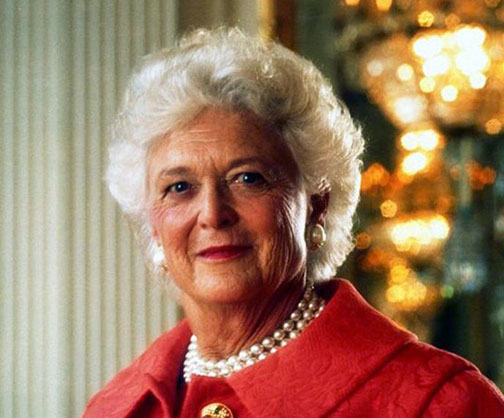(Reuters) – Former U.S. first lady Barbara Bush, the only woman to see her husband and son both sworn in as president, died yesterday, the Bush family said. She was 92.
Bush was the wife of the 41st president, George H.W. Bush, and mother of the 43rd, George W. Bush.
The Bush family had said in a statement on Sunday that she was in failing health, had decided not to seek further medical treatment and instead would focus on “comfort care.”
According to some media reports, Bush had been battling chronic obstructive pulmonary disease and congestive heart problems in recent years.
Bush was dubbed “The Silver Fox” by her husband and children. She was known for her snow-white hair and for being fiercely protective of her family.
She was first lady when her husband was in the White House from 1989 to 1993. Her son, Republican George Walker Bush, triumphed in the disputed 2000 U.S. election and was president from 2001 to 2009. The father-and-son presidents were sometimes referred to as “Bush 41” and “Bush 43.”
The Bushes celebrated their 73rd wedding anniversary in January.
“She will be long remembered for her strong devotion to country and family, both of which she served unfailingly well,” President Donald Trump and his wife, Melania, said in a statement that noted Bush’s championing of literacy “as a fundamental family value.”
Bush had an independent streak and could be sharp-tongued. As first lady, she promoted literacy and reading but said she was more interested in running a household than helping her husband run the country.
She discouraged speculation that she wielded political influence with the president like her predecessors – Ronald Reagan’s wife, Nancy Reagan, and Jimmy Carter’s wife, Rosalynn Carter.
“I don’t fool around with his office and he doesn’t fool around with my household,” she once said.
“She’ll speak her mind but only to him,” said Jack Steel, a longtime Bush aide.
The only other woman to be both wife and mother of U.S. presidents was Abigail Adams, the first lady from 1797 to 1801. She was a major influence on husband John Adams, the nation’s second president, but died before son John Quincy Adams was elected president in 1824.
Another of Bush’s sons, Jeb, who served as governor of Florida from 1999 to 2007, sought the 2016 Republican presidential nomination and she campaigned for him before he dropped out of the race.
The Bushes had six children. A daughter, Robin, died of leukemia in 1953 at age 3. Barbara Bush’s hair began to turn prematurely white after the shock of the girl’s death. In addition to George W. and Jeb, the other Bush children were sons Neil and Marvin and daughter Dorothy.
The Bushes married on Jan. 6, 1945, and Barbara set up households in numerous cities as her husband moved from being a Texas oilman to being a member of Congress, Republican Party leader, U.S. envoy to China and the United Nations and head of the Central Intelligence Agency.
George W. Bush made no secret that when he was growing up, it was his mother he had to answer to when he got into trouble.
Barbara Bush sometimes made biting remarks, particularly when she felt the need to defend her husband. One notable example came in 1984 when George H.W. Bush was seeking re-election as vice president under Reagan, a post he held from 1981 until becoming president in 1989.
She told reporters that Geraldine Ferraro, her husband’s Democratic rival for the vice presidency, was a “4 million dollar … I can’t say it but it rhymes with ‘rich.’” She apologized to Ferraro, the first woman running for U.S. vice president on a major-party ticket.
Texas Governor Ann Richards mocked her husband at the 1988 Democratic convention – saying: “Poor George … was born with a silver foot in his mouth” – and Barbara henceforth referred to Richards as “that woman.”
In 2012, Bush dismissed the political ambitions of U.S. conservative darling Sarah Palin, saying: “I think she’s very happy in Alaska – and I hope she’ll stay there.”
Bush generally refused to discuss publicly her personal views on controversial topics such as abortion, an issue on which she was believed to differ from her husband’s more conservative stance.
But during her husband’s 1992 re-election race, which he lost to Democrat Bill Clinton, she told reporters that abortion and homosexuality were “personal things” that should be left out of political conventions and party platforms. “I don’t think that’s healthy for the country when anyone thinks their morals are better than anyone else’s,” she said.
Opinion polls often showed her popularity as first lady exceeding her husband’s as president. “I don’t threaten anyone,” she said. “That’s because I’m everyone’s grandma.”

